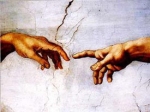Verse: Exodus 12:7 Then they shall take some of the blood and put it on the two doorposts and the lintel
of the houses in which they eat it.
Exodus 12:23-24
We have become a culture of covenant breakers instead of a culture of covenant keepers. The concept
of covenants and making unbreakable covenants has been replaced with the deceptive concept of
“liberty”, that is, “I can do whatever I want, whenever I want, and you have no right to judge me or try
to make limits on any of my decisions”. This is the reason we have “no-fault” divorce. We have decided
as a nation that we can change our minds about marriage, a basic covenantal agreement, at any time for
any reason. The biblical concept of marriage is to be the unchangeable, loving union between a man and
a woman where actually become ONE in marriage no longer two individuals in a partnership. This reflects the kind of relationship we are designed to have with our creator, YHWH.
Matt 19:5-6 (See also Genesis2:24; 1 Corinthians 6:12-20; Ephesians 5:28-33)
Therefore a man shall leave his father and his mother and hold fast to his wife, and they shall
become one flesh'? So they are no longer two but one flesh. ESV
From Malcom Smith’s book, The Lost Secret of the New Covenant:
“A contract is the exchange and passing of property, possessions; a covenant is the exchange of
persons. The contract says, ‘This is now yours,’ while the covenant says, ‘I am now yours.’ So God does
not merely promise His impersonal blessings; His blessing is the gift of Himself in the person.
There is much we could say on this topic, but suffice to say that, in our modern culture, we have taken
the concept of covenanting and reduced it to mere contractual agreements. From that we have
degenerated into a mindset that does not even honor contracts any more. We are contract breakers and
liars who do not even keep the integrity of our own words. Our condition is like that of Isaiah when he
said:
Isaiah 6:5
And I said: "Woe is me! For I am lost; for I am a man of unclean lips, and I dwell in the midst of
a people of unclean lips; for my eyes have seen the King, the Lord of hosts!" ESV
To understand the Bible and the language of the Bible we must shake off the mindset of this world and
step into a culture that understood covenants as the foundation of their lives and their identity.
Covenant cultures are universal; they have a history that goes back through every generation in every
region of the world. Not every covenant was a godly covenant--most were not. Nevertheless there is
something deep inside us that yearns and requires covenants and covenant keeping. We need to
appreciate that when, “Everyone doing what is right in their own eyes” (Judges 17:6), it leads us into
anarchy and destruction.
With this in mind, I want reveal a powerful covenant revelation concerning the Passover deliverance.
Excerpt from:
The Threshold Covenant by H. Clay Trumbull. Trumbull has authored two other authoritative books on
covenants titled, The Blood Covenant and The Salt Covenant. They can be found at Amazon.com or ChristianBook.com
HEBREW PASS-OVER, OR CROSS-OVER. SACRIFICE.
Page 185 - I. NEW MEANING IN AN OLD RITE. (Note: Emphasis are mine)
How the significance of the Hebrew passover rite stands out in the light of this primitive custom! It is not
that this rite had its origin in the days of the Hebrew exodus from Egypt, but that Jehovah then and
there emphasized the meaning and sacredness of a rite already familiar to Orientals. In dealing with his
chosen people, God did not invent a new rite or ceremonial at every stage of his progressive
revelation to them; but he took a rite with which they were already familiar, and gave to it a new and
deeper significance in its new use and relations.
Long before that day, a covenant welcome was given to a guest who was to become as one of the
family, or to a bride or bridegroom in marriage, by the outpouring of blood on the threshold of the door,
and by staining the doorway itself with the blood of the covenant And now Jehovah announced that he
would visit Egypt on a designated night, and that those who would welcome him should prepare a
threshold covenant, or a pass-over sacrifice, as a proof of that welcome ; for where no such welcome
was made ready for him by a family, he must count the household as his enemy. In announcing this
desire for a welcoming sacrifice by the Hebrews, God spoke of it as “Jehovah’s passover," as if the pass-
over rite was a familiar one, which was now to be observed as a welcome to Jehovah.' Moses, in
reporting the Lord's message to the Hebrews, did not speak of the proposed sacrifice as something of
which they knew nothing until now, but he first said to them, " Draw out, and take you lambs
according to your families, and kill the passover "— or the threshold cross-over; and then he added
details of special instruction for this new use of the old rite.
2. A WELCOME WITH BLOOD.
A lamb was the chosen sacrifice in the welcome to Jehovah. Each household, or family, was to take one
Iamb for this offering. No directions were given as to the place or manner of its sacrifice; for that seems
to have been understood by all, because of the very term "pass-over," or threshold cross-over. This is
Implied, indeed, in the directions for the use of the blood when it was poured out: " Kill the passover,” in
the usual place; "and ye shall take a bunch of hyssop, and dip it in the blood that is at the threshold
[Hebrew, saph and strike the lintel and the two side posts with the blood that is at the threshtold
In that welcome with blood there was covenant protection from Jehovah as he came into
Egypt to execute judgment on his enemies. The Egyptians had already refused him allegiance, and put
themselves in open defiance of his authority. They were now to be visited in judgment.' But in order to
the distinguishing of the Lord's people from his enemies, the Hebrews were to prepare a blood welcome
at their doorway, and the Lord would honor this welcome by covenanting with those who proffered it
"And Moses said, Thus saith the Lord, About midnight will I go out into the midst of Egypt : and
all the firstborn in the land of Egypt shall die, from the firstborn of Pharaoh that sitteth upon his throne,
even unto the firstborn of the maidservant that is behind the mill ; and all the firstborn of cattle. . . . But
against any of the children of Israel shall not a dog move his tongue, against man or beast : that ye may
know how that the Lord doth put a difference between the Egyptians and Israel." '
In furtherance of this purpose, the Lord asked for the sacrifice of the threshold cross-over by the
Hebrews : " For the Lord will pass through [the land] to smite the Egyptians ; and when he sees the
blood upon the lintel, and on the two side posts [of the Hebrew homes], the Lord will pass over [cross-
over or through] the door, and will not suffer the destroyer to come in unto your houses to smite
you." ' Obviously the figure here employed is of a sovereign accompanied by his executioner, a familiar
figure in the ancient East. When he comes to a house marked by tokens of the welcoming covenant,
the sovereign will covenant-cross that threshold, and enter the home as a guest, or as a member of
the family ; but where no such preparation has been made for him, his executioner will enter on his
mission of judgment'
3. BASON, OR THRESHOLD.
It is strange that the Hebrew word for " threshold " (saph) in this narrative is translated " basin " in
our English Bible. It is because of this that the identity of the passover sacrifice with the primitive
Threshold Covenant is so generally lost sight of This word
“Saph” occurs many times in the Old Testament text, and in nine cases out of ten it is translated "
thresh- old," or " door/* or " door-post," or the like. It would seem that it should be so translated in this
instance.
In some cases where saph is translated " bason," or “ cup," the term " threshold " would be
more appropriate, as when included in an enumeration of the temple furniture.' Bronze and silver
thresholds were often mentioned in the furniture of Babylonian and Assyrian temples ; and they might
well have had mention among the Hebrews. It is possible, however, that there was a cavity, as a blood
receptacle, in the threshold of houses or temples where sacrifices were so frequent ; and this would
account for the use of the word saph as "bason," even where it referred to the threshold of the door.
A striking illustration of the error of translating saph "a basin" or "a cup," is shown in the
rendering of Zechariah I3 : 1-3 in our English Bible. The Lord is there promising to protect the borders of
Jerusalem against all besiegers, " Thus saith the Lord, which . . . layeth the foundation of the earth: . , .
Behold, i will make Jerusalem a threshold [or, boundary stone, Hebrew, saph"] of reeling unto all the
peoples round about. ... I will make Jerusalem a burdensome stone for all the peoples." The figure
seems to be that of the besiegers staggering as they come against that foundation, or threshold stone,
which the Lord has established. Yet saph is here translated “cup," and the passage thereby rendered
meaningless.
There would seem, indeed, to be little room for doubt that saph should be translated
"threshold" in the description of the pass-over sacrifice. In Assyrian, the word sippu, from the same root
as the Hebrew saph means only threshold, not basin or cup.
4. PASS-OVER OR PASS-BY.
The common understanding of the term " passover,'* in connection with the Hebrew exodus from
Egypt, is that it was, on the Lord's part, a passing by those homes where the doorways were blood-
stained, without entering them. Yet this meaning is not justified by the term itself, nor by the
significance of the primitive rite. Jehovah did not merely spare his people when he visited judgment
on the Egyptians. He covenanted anew with them by passing over, or crossing over, the blood-stained
threshold into their homes, while his messenger of death went into the houses of the Lord's enemies
and claimed the first-born as belonging to Jehovah.*
This word “pesakh” translated “Passover” is a peculiar one. Its etymology and root meaning have been
much in discussion. It is derived from the root pesakh ''to cross over” a meaning which is still preserved
in the Hebrew word Tiphsakh the name of a city on the banks of the Euphrates, the Hebrew equivalent
of the classical Thapsacus.' Tipksakh means "crossing” apparently so called from the ford of the
Euphrates at that place.
Later Jewish traditions and customs point to the meaning of the original passover rite as a crossing
over the threshold of the Hebrew homes by Jehovah, and not of his passing by his people in order to
their sparing. A custom by which a Hebrew slave became one of the family in a Hebrew household,
through having his ear bored with an awl at the door-post of the house, and thereby blood staining the
doorway, is connected with the passover rite by the rabbis. "The Deity said: The door and the side-posts
were my witnesses in Egypt, in the hour when I passed- over the lintel and the two side-posts, and I said
that to Me the children of Israel shall be slaves, and not slaves to slaves ; I brought them out from
bondage to freedom ; and this man who goeth and taketh a lord to himself shall be bored through
before these witnesses."
According to Jewish traditions, it was on a passover night when Jehovah entered into a cross-over
covenant with Abraham on the boundary of his new possessions in Canaan. It was on a passover night
that Lot welcomed the angel visitors to his home in Sodom.' It was at the passover season that the
Israelites crossed the threshold of their new home in Canaan, when the walls of Jericho fell down, and
the blood -colored thread on the house of Rahab was a symbol of the covenant of the Hebrew spies with
her and her household. The protection of the Israelites against the Midianites,* and the Assyrians,* and
the Medes and the Persians,' and again the final overthrow of Babylon, all these events were said to
have been at the passover season. These traditions would seem to show that the passover covenant was
deemed a cross-over covenant, and a covenant of welcome at the family and the national threshold.
In the passover rite as observed by modem Jews, at a certain stage of the feast the outer door is
opened, and an extra cup and chair are arranged at the table in the hope that God's messenger will
cross the threshold, and enter the home as a welcome guest. All this points to the meaning of “ cross-
over” and not of "pass-by."
In some parts of northern and eastern Europe there is a custom still preserved among the Jews of
jumping over a tub of water on passover night, which is said to be symbolic of crossing the Red Sea, but
which shows that the passover feast was a feast of crossing over.*
5. MARRIAGE OF JEHOVAH WITH ISRAEL.
It seems clear that the Egyptian passover rite was a rite of threshold covenanting, as ordered of God and
as understood by the Israelites. Its sacrifice was on the threshold of the homes of the Hebrews on the
threshold of a new year,' and on the threshold of a new nationality. Then Israel began anew in all things.
Moreover, it was recognized as the rite of marriage between Jehovah and Israel ; as the very Threshold
Covenant had its origin in the rite of primitive marriage.
That first passover night was the night when Jehovah took to himself in covenant union the "Virgin of
Israel," and became a Husband unto her. From that time forward any recognition of, or affiliation with,
another God, is called “whoredom," " adultery," or “fornication." In this light it is that the prophets
always speak of idolatry. Jeremiah recognizes the first passover night as the time of this marriage
covenant, when he says :
“Behold, the days come, saith Jehovah, That I will make a new covenant With the house of Israel, and
with the house of Judah : Not according to the covenant that I made with their fathers In the day that I
took them by the hand To bring them out of the land of Egypt ; Which my covenant they brake,
Although I was an husband unto them, saith Jehovah. Jeremiah 31:31,32
And Jehovah, speaking through Ezekiel of his loving choice of the Hebrew daughter of the Amorite and
the Hittite, says : " Now when I passed by thee, and looked upon thee, behold, thy time was the time of
love ; and I spread my skirt over thee, and covered thy nakedness : yea, I sware unto thee, and entered
into a covenant with thee, saith the Lord God, and thou becamest mine." '
We can see that through the eyes of a covenant culture that YHWH does so much more than just making
an arbitrary exemption for Israel. Through the rites and the powerful symbols, YHWH came into the
homes of Israel, imparted Himself (through eating the flesh of the whole lamb) and later walked out of
Egypt WITH Israel.
This whole event of deliverance, which was a historical reality, is still only a picture or “sign” that points
to the reality of the spiritual deliverance accomplished by our Messiah Jesus, the Lamb of God. The
details of the threshold covenant agreement help us to understand that our salvation is not just a
mental ascent to Jesus provision, but it is the initiation of a covenant union with YHWH.
Jesus is the Door, He is the Lamb, He is the Way into the kingdom of God and the way out of Egypt.
When we “take the Blood” and place it over the door of our hearts (the place where we really live),
YHWH comes in as a welcome guest and covenant partner. YHWH simultaneously destroys the first born
(the future) of every authority in Egypt, and we walk out of that place towards the inheritance given to
from YHWH.
This covenant welcome was extended to all who believed--whether of Israel or the “mixed multitude”
that came out of Egypt on that same day (Exodus 12:38).





Terms & Conditions
Subscribe
Report
My comments